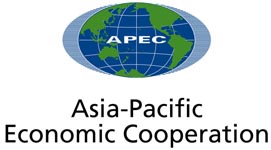Asia-Pacific summit seeks more US engagement
 Singapore - The 16th Asia Pacific Economic Cooperation (APEC) summit kicked off Saturday with calls for greater US engagement in the region.
Singapore - The 16th Asia Pacific Economic Cooperation (APEC) summit kicked off Saturday with calls for greater US engagement in the region.
US President Barack Obama, although he failed to attend the opening session of the APEC summit, made known his commitment to the region Saturday morning in Tokyo.
"As an Asia Pacific nation, the United States expects to be involved in the discussions that shape the future of this region, and to participate fully in appropriate organizations as they are established and evolve," he said.
APEC groups 21 countries in East Asia and the Americas, including economic heavyweights such as the US, Mexico, Canada, China, Japan, South Korea and the seven largest economies of South-east Asia.
Obama acknowledged that the US "has been disengaged" in recent years from regional organizations that promote security and prosperity in Asia, a reference to his predecessor George W Bush's rejection of international organizations.
Obama, who will arrive in Singapore Saturday night, also announced the US's readiness to engage in the little-known free trade deal as an initial step towards molding a region-wide trade agreement with the Asia-Pacific.
The Trans-Pacific Strategic Economic Partnership Agreement (TPP) wa set up in 2005 between Brunei, Chile, New Zealand and Singapore, and some are hoping will be used as model for a region-wide FTA for the Asia-Pacific.
Washingon's willingness to join the TPP may prove an important gesture that the US is serious about re-engaging with the region, which many Asian leaders feel has been ignored.
Singapore's Senior Statesman Lee Kuan Yew on Friday urged the US to take a more active economic role in East Asia or risk losing its dominant position as the leading economic and military force.
"And after a while people will say why are you in the Asia Pacific maintaining peace for Japan, China and ASEAN, so you will have a very different world," he noted.
The US Pacific fleet has been the main security force in East Asia for decades.
"On the political and security front it is important to fundamentally recognize that so much of the peace and security we have enjoyed in the region for the last 30 years has been underpinned by the stabilizing presence of the United States security forces," Australian
Prime Minister Kevin Rudd said Saturday.
"We need to recognize the absolute centrality of the US economy to the future shape of our economies," he added.
Rudd also proposed the establishment of a new Asia-Pacific Community, saying that the region needed one single organization combining political, economic and security issues on its agenda.
Rudd and other APEC leaders have emphasized the need for the US to play a key role in the region.
"We need to evolve in this region an inclusive, long-term regional architecture both economic, political and security that includes the United States," Rudd said. (dpa)